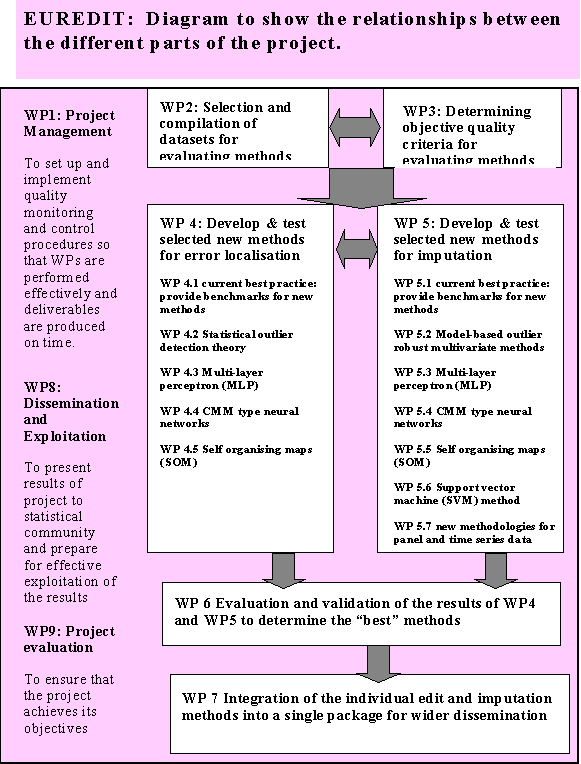Workplan
EUREDIT is investigating neural networks, support vector machines, model-based and donor-based editing and imputation methods. Of these, the first two represent technologies that have only recently become readily available, and offer promise for providing accurate imputation methods in situations where traditional methods run into difficulties. Model-based methods, particularly those based on multivariate models for the data generation process, will be investigated and further developed. Donor-based methods are already in place in a number of NSIs (National Statistical Institutes) and the project includes this methodology in order to provide a baseline for comparing the performance of the other more novel methods.
Although the coverage of methods and representative data sets in EUREDIT is quite broad, it is obviously impractical to attempt to cover all possible novel methods and data sets in detail with a realistic budget. For this reason, a certain amount of pre-selection has been performed during the preparatory work for the project. This was performed on the basis of previous experience with the methods among the partners, and a choice based on those that seem to show good potential for this application. This is justified because, although the coverage is not complete, EUREDIT will establish a framework applicable to future research projects in this field. Thus any "gaps" can be filled in the future using the data sets and methodological framework developed within EUREDIT to carry out similar evaluations using a new or different editing or imputation technique.
The Euredit work packages are (briefly) as follows:
| WP1 Project management | |
| WP2 identifies and selects data sets representing a broad range of error types based on a classification of errors, with a further level of variation introduced through a requirement for different types of data. | |
| WP3 develops a methodological framework that will ensure the quality of the experimental results and allow meaningful and valuable comparisons to be made when the various results across the EUREDIT project are collated. | |
| WP4.1 and WP5.1 establish a performance baseline using currently in-use methods for data editing and imputation. | |
| WP4.2 through WP4.5 and WP5.2 through WP5.7 develop and evaluate a selected range of new or recent techniques which offer potential advantages in data editing or imputation. | |
| WP6 collates the results of each experiment and compiles a performance comparison between all techniques and data/error types, leading to detailed recommendations about optimal choice of methods in a range of common situations. | |
| WP7 disseminates selected (best) methods by developing portable evaluation software to allow side-by side comparison of all methods by any partner in the project consortium on a single computing platform, even though the original experiments may have been carried out using a range of different software and hardware platforms. | |
| WP8 is focused on co-ordination and planning of dissemination and exploitation activities across the EUREDIT project. | |
| WP9 concerns an internal assessment/evaluation of the project. |
